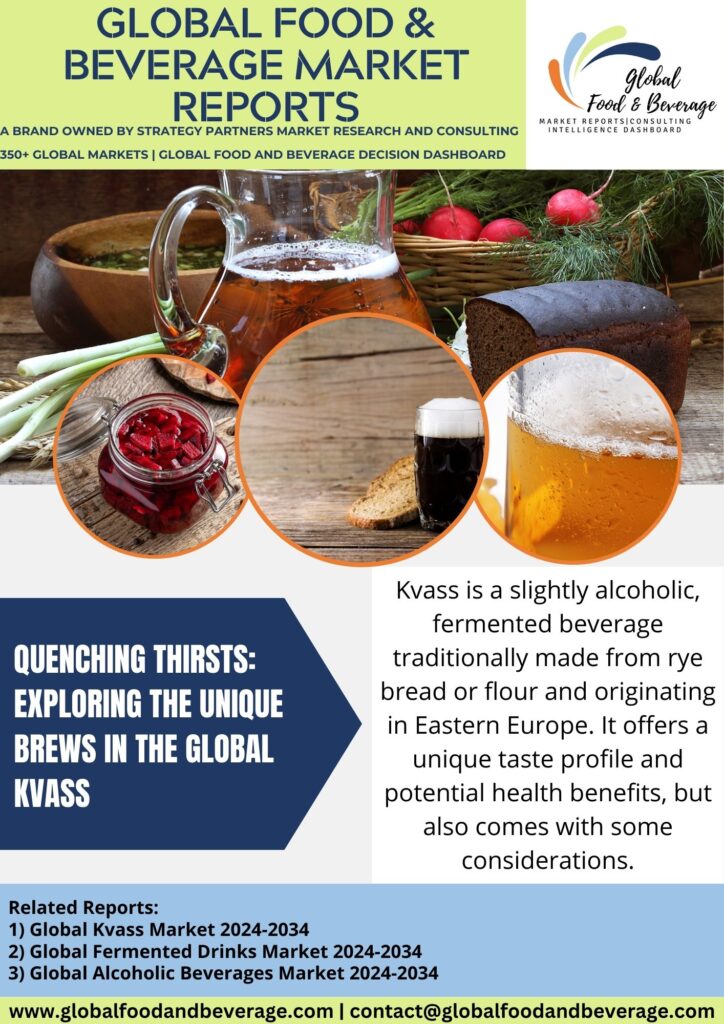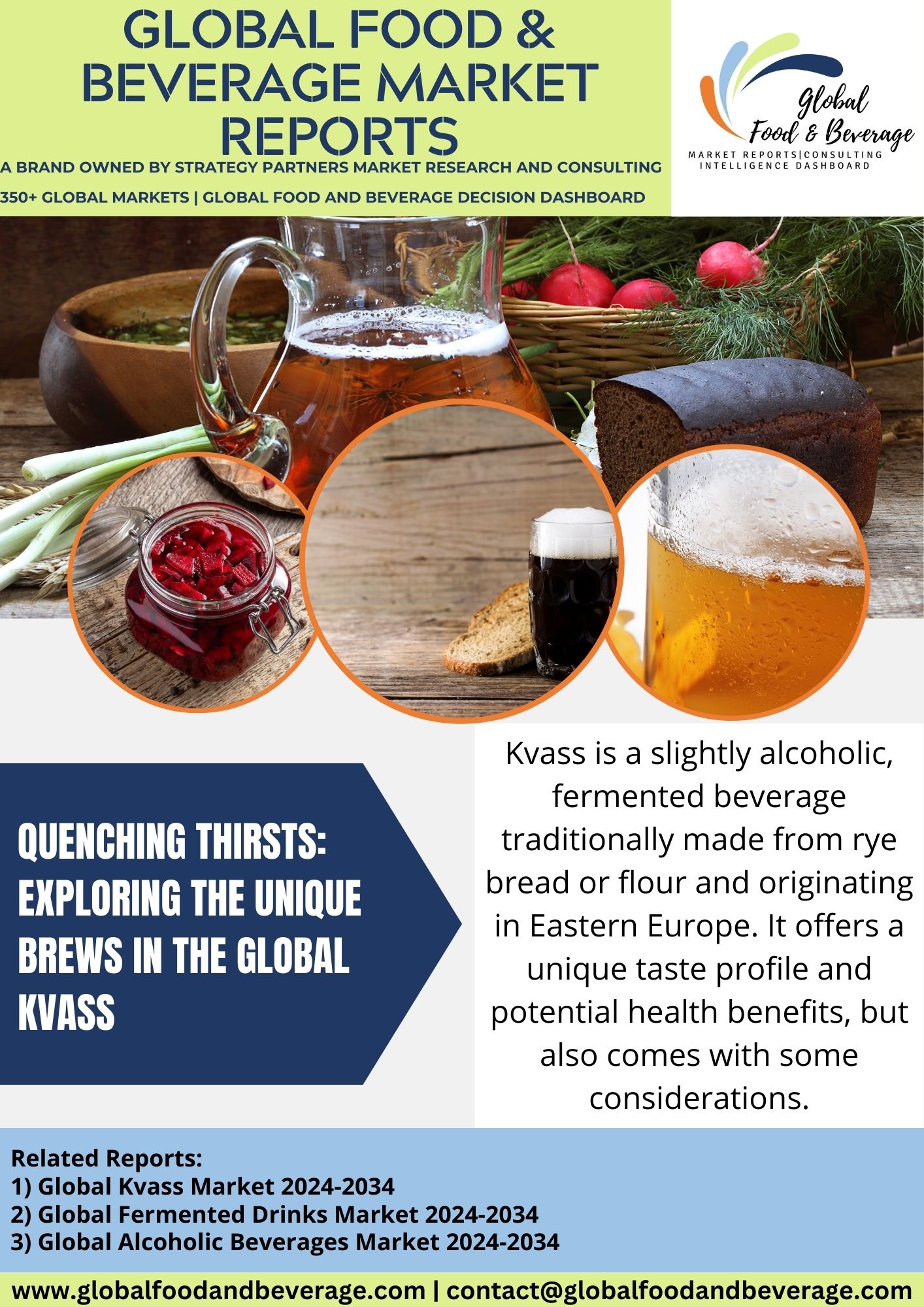
Kvass, a traditional fermented beverage with roots in Eastern Europe, particularly Russia, holds a significant place in the region’s culinary and cultural heritage. This centuries-old drink is crafted through a straightforward yet time-honored process that involves fermenting bread, usually rye, with water, sugar, and sometimes additional flavorings like fruits or herbs. The result is a mildly alcoholic, tangy beverage with a distinct flavor profile.
The process of making kvass typically begins with soaking slices of bread in water and combining the mixture with sugar. This concoction is left to ferment for several days, allowing wild yeast and bacteria to convert the sugars into alcohol and carbon dioxide. The addition of dried fruits, berries, or mint during fermentation imparts unique flavors to the brew, contributing to the diverse variations of kvass found across different regions.
Kvass holds cultural significance, often being referred to as “bread drink” due to its foundational ingredient. Traditionally consumed as a refreshing beverage during warmer months, kvass has become an integral part of Russian and Eastern European summer rituals. Street vendors and local markets offer it in various forms, from homemade batches to commercially produced bottles, providing a refreshing respite from the heat.
Beyond its cultural importance, kvass is recognized for potential health benefits associated with fermentation. As a probiotic-rich beverage, it supports gut health by introducing beneficial microorganisms to the digestive system. The presence of B vitamins, enzymes, and organic acids further contributes to the nutritional profile of kvass, making it a nourishing and hydrating option.
In recent years, kvass has experienced a resurgence in popularity, not only in its countries of origin but also internationally. Its appeal lies in its distinct taste – a balance of sweetness, tartness, and a hint of earthiness – and its status as a unique alternative to commercially available sodas and sugary drinks. Modern variations may include innovative ingredients or adaptations to suit contemporary tastes, showcasing kvass as a versatile and adaptable beverage.
ADVANCEMENTS
Kvass, a traditional fermented beverage with origins in Eastern Europe, has seen recent advancements that blend heritage with modern trends, contributing to its popularity as a functional and refreshing drink. One notable breakthrough is the expansion of flavors and ingredients. While traditional kvass is made from fermented bread, contemporary variations include fruit-infused and herbal blends, offering a diverse range of flavors to appeal to a broader consumer base. This innovation aligns with the demand for unique and exotic taste experiences.
Advancements in production techniques contribute to the consistency and quality of kvass. Producers are implementing controlled fermentation processes, optimizing yeast and bacterial strains, and exploring variations in brewing times to ensure a reliable and high-quality product. These efforts aim to meet consumer expectations for a consistent and enjoyable kvass experience.
The integration of functional ingredients and health-focused formulations is a notable trend. Some producers are enhancing kvass with probiotics, adaptogens, and natural sweeteners, capitalizing on the rising interest in beverages that offer wellness benefits. This aligns with evolving consumer preferences for functional and health-promoting beverages.
Advancements in packaging contribute to the modernization of kvass. Single-serve bottles, cans, and innovative packaging designs enhance the convenience and portability of kvass, making it more accessible for on-the-go consumption. This addresses contemporary lifestyle preferences and aligns with the demand for convenient and sustainable packaging options.
The global recognition and export of kvass to international markets represent a significant advancement. Traditional kvass is finding its way onto shelves beyond its Eastern European roots, appealing to a global audience interested in exploring diverse and authentic beverages.
CHALLENGES
Kvass, a traditional fermented beverage originating from Russia, faces challenges related to modern production, market dynamics, regulatory compliance, consumer preferences, and sustainability. One significant challenge is maintaining the authenticity and traditional production methods of kvass in a modern commercial setting. Traditional kvass is often homemade or produced on a small scale, and scaling up production while preserving its unique flavor profile poses ongoing challenges.
Market competition is intense, with various beverage options available globally. Successfully differentiating kvass products, addressing diverse flavor preferences, and staying competitive demand continuous innovation in formulations, packaging, and marketing strategies.
Regulatory compliance can be a challenge in the kvass industry, especially concerning safety standards, labeling requirements, and ingredient regulations. Adhering to diverse regulations across regions or countries requires continuous diligence to ensure transparency and compliance with evolving standards.
Consumer perception and education are vital challenges for the kvass industry. While some consumers appreciate the traditional and probiotic aspects of kvass, others may be unfamiliar with fermentation or express concerns about taste, consistency, or its categorization as a non-alcoholic beverage. Effectively communicating the nutritional benefits and unique characteristics of kvass is crucial for building consumer awareness and trust.
Sustainability considerations, such as responsible sourcing of ingredients, eco-friendly packaging, and waste management, are emerging challenges. Meeting consumer demands for environmentally conscious practices adds complexity to the production and marketing of kvass.
CONCLUSION
Kvass emerges as a historic and enduring beverage, weaving through the cultural fabric of Eastern Europe. From its humble origins as a traditional fermented drink to contemporary reinterpretations, kvass continues to captivate with its refreshing tang and probiotic benefits. The industry’s commitment to preserving authenticity while embracing innovative flavors reflects a dynamic blend of tradition and modernity. As global tastes evolve towards functional beverages, kvass stands resilient, offering a flavorful journey that bridges generations. The future promises a continued revival, where this fermented elixir not only maintains its cultural roots but also becomes a celebrated symbol of health-conscious refreshment in diverse corners of the world.
